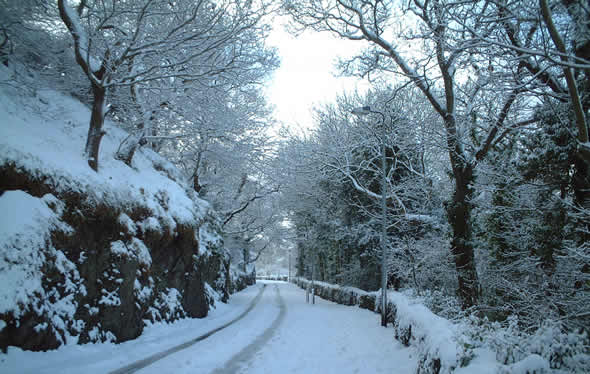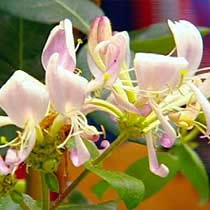Nadolig Llawen
Joyeux Noël
聖誕快樂
Nollaig shona doibh
¡Feliz Navidad!
Nollick Ghennal
Bo Nadal
Nollaig chridheil
メリークリスマス
Buon Natale
Frohe Weihnachten
Bon Nadal
Veselé vánoce
and Merry Christmas!
Category: Irish (Gaeilge)
Irish language strategy / Straitéis don Ghaeilge
According to an article I found today, the Irish government has a strategy, launched yesterday, to increase the number of regular speakers of Irish in Ireland by a factor of three over the next 20 years. Apparently there are currently about 83,000 who speak Irish on a daily basis, and the government would like this number to increase to 250,000 by 2030.
Their aims are:
- – to increase the number of families throughout Ireland who use Irish as the daily language of communication
- – to provide linguistic support for the Gaeltacht as an Irish-speaking community
- – to ensure that in public discourse and in public services the use of Irish or English will be, as far as practical, a choice for the citizen to make
- – to ensure that Irish becomes more visible in society, both as a spoken language by citizens and also in areas such as signage and literature.
Details of the strategy can be found at:
http://www.pobail.ie/en/IrishLanguage/Strategy/Strategy.pdf (English)
http://www.pobail.ie/ie/AnGhaeilge/Straiteis/Strait%C3%A9is.pdf (Irish)
I haven’t read it all in detail, but it looks like there are plenty of good ideas in there. Whether they can all be implemented and how well is another matter. Reversing a language shift that has been going for centuries is a difficult process.
Colds, streams and rivers

It’s rather cold here at the moment with daytime temperatures not much above freezing, and nighttime dropping to -10°C (14°F) or even -20°C (-4°F) in places. As a result, some of the snow that fell last week has frozen solid and been trampled down on pavements and ungritted back streets making them decidedly icey and slippery.
I also have a cold at the moment, so I thought I’d look into how to say “I have a cold” in a number of languages. In French it’s “Je suis enrhumé” or “I am enrhumed”. Enrhumé comes from rhume (cold), which comes from the Old French reume, from the Latin rheuma, from the Greek rheuma (stream, current, a flowing), from rhein (to flow), from the Proto-Indo-European *sreu- (to flow). The Proto-Indo-European *sreu- is also the root of the Irish sruth (stream, river), the Welsh ffrwd (stream) and the Polish strumyk (brook). [source].
The Czech word for cold rýmu appears to be spring from the same source – mám rýmu is “I have a cold” by the way – as does the English word rheumatism. You can also say jsem nachlazený for “I have a cold” in Czech, which has a similar structure to the French phrase – “I am colded” or something like that.
In Welsh you don’t have a cold but rather a cold is on you: mae annwyd arna i, and the other Celtic languages use the same structure, “Is cold on/at me”: tá slaghdán orm (Irish), tha ‘n cnatan orm (Scottish Gaelic), ta feayraght/mughane aym (Manx).
In German “I have a cold” is Ich bin erkältet (“I am becolded?”), with erkältet coming from kalt (cold).
In Mandarin Chinese you say 我感冒了 (wǒ gǎnmào le) or “I catch cold [change of state particle]”.
Twndis
Twndis [‘tʊmdɪs] (nm, pl: twndisau) = funnel – also twnffat [‘tʊmfat]
I discovered the Welsh words twndis and twnffat last night. I’m not sure why the subject of funnels came up in conversation, but these words particularly appealed to me, especially the latter.
This morning I found out that the word tundish is used for funnel in Joyce’s Portrait of the Artist as a Young Man, and that it originally meant “a funnel made to fit into the bung of a tun”. A tun is a large cask, but I’m sure you knew that [source]. These days a tundish is sort of funnel used in metal casting, and also in plumbing [source].
Tundish appears to be related to the Welsh word twndis, and the word tun is possibly of Celtic origin: – from the Middle Irish tunna, and the Old Irish toun (hide, skin).
Words for funnel in the Modern Celtic languages come from the same root: as well as twndis in Welsh, there’s tunnadair (funnel, filler, tunning-dish, tunner) in Scottish Gaelic, tonnadóir in Irish, tunneyder in Manx and tum in Breton.
I’m not sure of the etymology of twmffat, but ffat on it’s own means slap or pat, and ffatio means to slap.
Jumpers and sea pigs

Llamhidydd, (n/m) [pl. llamhidyddion] – porpoise, dancer, acrobat, jumper
Today’s word appears in a book I’m reading at the moment and is a new one to me. I’m not sure about the etymology of the hid part, but llam means jump, and the suffix -ydd indicates a person or agent.
As well as jump, llam also means fate, leap, bound, stride, step, and is found in such words as llamddelw – puppet (jump + image/idol); llamu and llamsach – to jump; llawsachus – capering, prancing, and llamwr – leaper. Llam most likely comes from the same root as the Irish léim, Scottish Gaelic leum, Manx lheim, Cornish lamma and Breton lam. More common Welsh words for jump and to jump are naid and neidio.
Other Welsh words for porpoise include môr-fochyn (sea pig) and morhwch (sea sow), which is also applied to dolphins. The Irish for porpose is muc mhara (sea pig).
The English word porpoise comes from the French pourpois, which is from Medieval Latin porcopiscus, which is a compound of porcus (pig) and piscus (fish).
Another English word for porpoise is apparently mereswine, the roots of which can be traced back to the Proto-Germanic *mariswīnaz (dolphin, porpoise), from *mari/*mariz (sea) and *swīnaz/*swīnan (swine, pig), via the Middle English mereswin and the Old English mereswīn.
Weeds
Yesterday I finally started work on my garden, and one of the first things I did was a bit of weeding. The large crop of dandelions and other weeds in my lawn will take quite a while to remove, but in the meantime I thought I’d look at the origins of a few garden-related words.
Weed comes from the Old English word wēod (grass, herb, weed), which is related to the Old High German word wiota (fern), and probably comes from the Proto-Germanic word *weud-. The verb to weed comes from the Late Old English weodian [source].
Words for weed in other languages include: chwynnyn (Welsh), fiaile (Irish), 野草 [yěcǎo – “wild grass”] (Mandarin), mauvaise herbe (French – “bad grass”), 雑草 [zassō – “crude/miscellaneous grass”] (Japanese).
Dandelion comes from the Middle French dent de lion (lit. “lion’s tooth”), a calque translation of the Middle Latin dens leonis – the leaves are shaped a bit like lion’s teeth.
Folk names for dandelion include tell-time, which refers the practice of blowing the seeds – the number of breaths needed supposedly being the hour, and the Middle English and French names piss-a-bed and pissenlit, which refer to its diuretic properties [source].
Carpets and harvests
I moved into my new house yesterday and am currently having new carpets fitted, which got me wondering about the origins of the word carpet.
Carpet has been traced back to the Proto-Indo-European root *kerp- (to pluck, gather, harvest) via the Old French carpite (heavy decorated cloth), the Middle Latin carpita (thick woolen cloth) the past participle of the Latin carpere (to card, pluck).
*kerp- is also the root of the English word harvest, the Greek καρπός (karpos – fruit, grain, produce, harvest, children, poetry [fruit of the mind], profit); and the Irish ciorraigh (to cut, hack, maim).
Sources: Online Etymology Dictionary and Wiktionary.
Winter climber

The word zimolez, which is honeysuckle in Czech, came up the other day during a conversation with a Czech friend. It comes from zima (winter) and lézt (to climb, crawl, creep), so could be translated as “winter climber”.
Other interesting words that came up include plšík (doormouse), smršť (tornado) brblat (to grizzle, beef, grouch, mutter) and žbrblat (to mutter to oneself). The root smršť also appears in words related to shrinking and contracting, such as smrštit (to shrink), smrštěný (contracted, shrunk) and smršťovací fólie (shrink wrap).
What delicious consonant clusters!
The English name honeysuckle comes from the Old English hunigsuge (honey-suck). An alternative name is Eglantine, which comes from the Old French aiglent (dog rose), from the Vulgar Latin aquilentus (rich in prickles), from the Latin aculeus (spine, prickle), a diminutive of acus (needle)
Names for honeysuckle in other languages include:
- German: Geißblatt (goat leaf)
- French: Chèvrefeuille (goat leaf)
- Irish: Féithleann (vein ale ?)
- Italian: Caprifoglio (goat leaf)
- Latin: Lonicera
- Spanish: Madreselva (mother jungle)
- Welsh: Gwyddfid (wild hedge ?) or Llaeth y gaseg (mare’s milk)
Wire twists
The electricians have been rewiring my new house this week and finished today, so I thought it would be interesting to looking the etymology of the word wire.
According to the Online Etymology Dictionary, wire comes from the Old English word wir (metal drawn out into a thread), which is related to the Old Norse word viravirka (filigree work), the Swedish word vira (to twist), and the Old High German word wiara (fine gold work).
Going further back we find that the Proto-Indo-European root of wire and wir is *wei- (to turn, twist, plait). This is also the root of the Old Irish word fiar (bent, crooked – cam in Modern Irish); the Welsh word gwyr (bent, crooked); and the Latin viere (to bend, twist).
The Proto-Indo-European Etymology dictionary gives the PIE root of wire as *chislom.
There are quite a few idiomatic expressions involving wire, including:
- the wire – another for the telephone, and the name of a TV series
- down the wire – right up to the last moment
- get in under the wire – to accomplish something with little time to spare
- get one’s wires crossed – to misunderstand
- pull wires – to exert influence behind the scenes using personal connections, etc – also ‘pull strings’
- wire in – to set about (something, especially food) with enthusiasm (not one I’ve come across before)
Does wire feature in equivalents of these expressions in other languages, or in other idioms?
Linguistics and languages
When I mention to people that I’m a linguist or have studied linguistics, they often ask something like “Oh, which language(s)?” The popular idea of a linguist seems to be someone who studies / speaks quite a few languages, and linguistics is thought of as studying languages, rather than the study of language in general. As I have studied both linguistics and quite a few languages, I could call myself a linguist in both the scientific and popular senses, and to avoid explaining linguistics every time I often go along with the popular definition.
Most of the people I met in Ireland were interested in languages, and some of them were interested in linguistics, including an American lass who is keen to study linguistics and document some of the native languages of North America, particularly of Alaska. There was also someone else who is studying Irish Sign Language (ISL – Teanga Chomharthaíochta na hÉireann) and was keen to find out about British Sign Language (BSL). Very few ISL signs were familiar to me, and it seems to have more in common with French and American Sign Languages than with BSL.
When people discovered that I speak Welsh, quite a few of them asked me it was hard to learn, as they think it looks very difficult to pronounce. My Welsh-speaking friends make similar comments about Irish. I find Welsh spelling easier as most letters only have one sound and all letters are pronounced, whereas most letters have at least two sounds in Irish and quite a few of them are not pronounced.